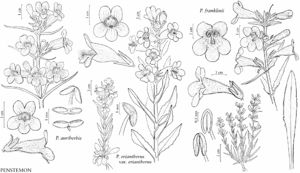Penstemon auriberbis
Contr. U.S. Natl. Herb. 20: 339. 1920.
Stems ascending to erect, 10–30(–35) cm, retrorsely hairy proximally, glandular-pubescent distally. Leaves basal and cauline, not leathery, glabrous, puberulent, or retrorsely hairy; basal and proximal cauline petiolate, (15–)30–60(–100) × (1–)2–5(–7) mm, blade lanceolate to linear, base tapered, margins entire, apex obtuse to acute; cauline 2–6 pairs, sessile, (25–)40–80 × 2–7 mm, blade lanceolate to linear, base tapered to slightly clasping, margins entire or obscurely denticulate, apex acute to acuminate. Thyrses continuous or interrupted, cylindric or slightly secund, (5–)7–23 cm, axis glandular-pubescent, verticillasters 3–8, cymes 2–4-flowered, 2 per node; proximal bracts lanceolate to linear, 18–100 × 2–12 mm; peduncles and pedicels glandular-pubescent. Flowers: calyx lobes ovate to lanceolate, (6–)7–9 × 1–2 mm, densely glandular-pubescent; corolla violet to lilac or pinkish blue, with magenta or violet nectar guides, weakly bilabiate, tubular-funnelform, (16–)18–22(–24) mm, moderately white-pilose internally abaxially, tube 4–6 mm, throat gradually inflated, not constricted at orifice, 7–9 mm diam., rounded abaxially; stamens included, pollen sacs divergent, navicular, 1.2–1.5 mm, dehiscing incompletely, connective not splitting, sutures papillate; staminode 13–16 mm, reaching orifice or exserted, 0.6–0.9 mm diam., tip recurved, distal 10–15 mm moderately to densely villous, hairs orangish, to 2.5 mm; style 11–14 mm. Capsules (6–)8–10 × 3–4 mm. 2n = 16.
Phenology: Flowering May–Aug.
Habitat: Silty or gravelly soils, shortgrass prairies, sagebrush shrublands.
Elevation: 1200–2500 m.
Discussion
Penstemon auriberbis is known from Chaffee, Costilla, Custer, El Paso, Elbert, Fremont, Huerfano, Kiowa, Las Animas, Otero, and Pueblo counties, Colorado, and Colfax and Union counties, New Mexico. The species is unique in sect. Cristati in having incompletely dehiscing anthers.
Penstemon parviflorus is known only from the type locality in Montezuma County, Colorado (S. L. O’Kane 1988). A report for McKinley County, New Mexico, has not been confirmed. The type was collected July 1890 by Alice Eastwood, reputedly near Mancos, Colorado. F. W. Pennell (1920b) distinguished P. parviflorus from the more eastern P. auriberbis primarily by the former’s shorter corollas, longer calyx lobes, and more slender stems. D. D. Keck (1938) observed that the type specimen has whorled cauline leaves, which Pennell did not mention in his description, and Keck suggested that P. parviflorus might be a genetically aberrant individual of P. auriberbis that was accidentally introduced into Montezuma County. Whorled cauline leaves are not uncommon in P. auriberbis, and they occur rarely in other species in sect. Cristati. Penstemon parviflorus appears to be P. auriberbis, and the type specimen actually may have come from south-central Colorado; Eastwood collected P. auriberbis in Pueblo County in 1891.
Selected References
None.
